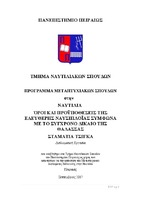Όροι και προϋποθέσεις της ελεύθερης ναυσιπλοΐας σύμφωνα με το σύγχρονο δίκαιο της θάλασσας

Προβολή/
Λέξεις κλειδιά
Αιγιαλίτιδα ζώνη ; Πλους διέλευσης ; Αβλαβής διέλευση ; Διεθνή στενά ; Ελευθερία ναυσιπλοΐας ; Territorial waters ; Transit passage ; Innocent passage ; International straits ; Freedom of navigationΠερίληψη
Το σύγχρονο δίκαιο της θάλασσας υπογραμμίζει τις νέες τάσεις και τα ενδιαφέροντα των κρατών για την ελευθερία της ναυσιπλοΐας, η οποία αποτελεί την πρωτεύουσα και πλέον παραδοσιακή χρήση των θαλασσών από όλα τα κράτη, είτε είναι περίκλειστα είτε παράκτια. Ο όρος της ανοιχτής θάλασσας περιλαμβάνει το θαλάσσιο εκείνο χώρο πλην των εσωτερικών υδάτων και της αιγιαλίτιδας ζώνης και της Αποκλειστικής Οικονομικής Ζώνης (ΑΟΖ). Τα πλοία ωστόσο, διέπονται από το θεσμό της αβλαβούς διέλευσης όταν για την εξυπηρέτηση της ναυσιπλοΐας τους απαιτεί να διασχίσουν τα χωρικά ύδατα ενός κράτους καθώς και διαμέσου των διεθνών στενών που εγγυόνται τη διεθνή ναυσιπλοΐα και την κατοχύρωση των δικαιωμάτων στο θαλάσσιο χώρο των ζωνών εθνικής δικαιοδοσίας. Η έννοια του πλου διέλευσης που εισήγαγε η Σύμβαση για το Δίκαιο της Θάλασσας το 1982, στην ουσία σημαίνει ελευθερία διέλευσης, τηρουμένων των κανονισμών που έχουν θεσπιστεί για την ασφάλεια και την προστασία του παράκτιου κράτους. Υπό το πρίσμα του παρόντος νομοθετικού πλαισίου έχουν ήδη καλυφθεί πολλαπλές πτυχές της θαλάσσιας κυριαρχίας και κρατικής δικαιοδοσίας, εντούτοις, οι νέες περιβαλλοντολογικές και τεχνολογικές προκλήσεις χρήζουν περαιτέρω διερεύνησης τονίζοντας καίρια νομικά κενά.


